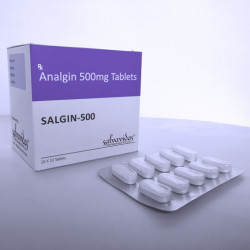Analgin (metamizole) Coupons, Discounts & Cost
Analgin (metamizole) is a non-narcotic analgesic agent that belongs to the group of non-steroidal anti-inflammatory drugs. One way to save money on the Analgin (metamizole) retail cost regardless of income and insurance status is to use Analgin (metamizole) coupons or discount cards from RXCoupons. Use our Analgin (metamizole) coupons at your online pharmacy and receive up to 75% off the sale price each time you refill your prescription.
Analgin (metamizole) drug information
Analgin (metamizole) is a non-narcotic analgesic agent that belongs to the group of non-steroidal anti-inflammatory drugs. The main active ingredient is metamizole sodium. It is characterized by a pronounced analgesic, antipyretic and anti-inflammatory effect.
Metamizole blocks the transmission of pain impulses and reduces the reaction of the brain structures that occurs in response to painful stimuli.
Analgin is rapidly absorbed in the digestive tract. The maximum concentration of metamizole can be achieved within 1.5 hours. The drug is excreted by the kidneys.
Analgin (metamizole) instructions for use
The main indication for Analgin (metamizole) is pain of various origins: - Headache (including migraine); - Toothache; - Neuralgia; - Radiculitis; - Intestinal or biliary colic; - Pain after injuries or burns.
The drug can be used for pain relief after surgery or painful diagnostic procedures.
Analgin is also used to reduce high temperature in cases where other antipyretics are ineffective.
Do NOT use Analgin (metamizole) in the following cases
Analgin (metamizole) should not be used in the presence of the following diseases and conditions: - Allergic reactions to the drug’s components; - Renal failure; - Liver failure; - Violation of the bone marrow (after cytotoxic therapy); - Leukopenia, hereditary hemolytic anemia and other forms of anemia; - Rheumatic fever; - Dysmenorrhea; - Nonsteroidal anti-inflammatory drug hypersensitivity reactions; - Children under 10 years; - First and third trimesters of pregnancy.
Dosage indications for Analgin (metamizole)
Analgin (metamizole) tablets are taken after a meal, with plenty of water. The duration of treatment is 5 days.
The dosage is determined by the intensity of pain.
Daily dose for adults: 250-500 mg 2-3 times per day. The highest single dose is 1 g, daily dose - 3 g. The single dose for children aged 2-3 years is 50-100 mg; 4-5 years - 100-200 mg; 6-7 years - 200 mg; 8-14 years - 250-300 mg (2-3 times per day).
The therapeutic doses of Analgin should be reduced for elderly patients and patients with impaired renal function (glomerulonephritis, pyelonephritis).
Analgin (metamizole) warnings
Metamizole sodium is widely used in combination with fenpiverinium bromide and pitofenone hydrochloride (as analgesic agent with spasmolytic activity).
Possible side effects of Analgin (metamizole)
According to numerous reviews about Analgin (metamizole), the drug may cause a variety of adverse reactions: excessive sleepiness, palpitations, tremors and bowel disorders. These adverse reactions usually disappear after a month. Some patients say that it is possible to gain weight during Analgin therapy.
Allergic reactions: skin rash, angioedema, anaphylactic shock.
Hematopoietic system: rarely - leukopenia, agranulocytosis.
The drug can cause allergic reactions, such as urticaria, angioneurotic edema, Stevens-Johnson syndrome, toxic epidermal necrolysis, bronchospastic syndrome, anaphylactic shock. Patients with atopic asthma and hay fever are at higher risk of having allergic reactions.
Analgin (metamizole) overdose
Analgin (metamizole) overdose symptoms include nausea, vomiting, epigastric pain, vestibular disorders, tinnitus, tonic-clonic seizures, coma, agranulocytosis, aplastic anemia, hemorrhagic diathesis, skin rash.
Treatment: gastric lavage, symptomatic therapy.
Interaction with other pharmaceutical agents
Analgin (metamizole) should not be used with other analgesics, antipyretics, NSAIDs (high risk of toxic effects).
Metamizole enhances the activity of anticoagulants, oral hypoglycemic drugs, corticosteroids, indomethacin.
Metamizole may cause hyperthermia when used with phenothiazine derivatives. Sedatives and anxiolytics enhance the analgesic effect of metamizole. Tricyclic antidepressants, oral contraceptives and allopurinol may increase the toxicity of metamizole.

